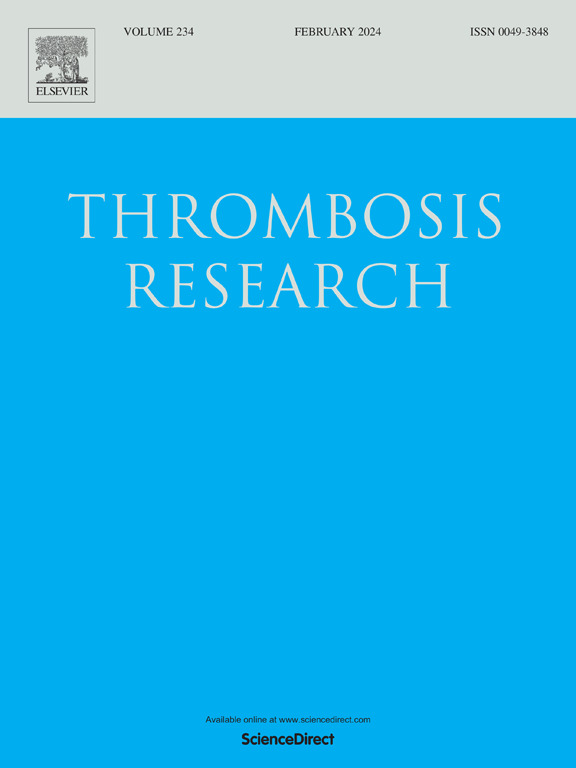低分子肝素预防腹部或盆腔癌手术静脉血栓栓塞的疗效和安全性:随机对照试验的系统回顾和网络荟萃分析
IF 3.7
3区 医学
Q1 HEMATOLOGY
引用次数: 0
摘要
背景:低分子肝素(LMWHs)已被广泛应用于腹部或盆腔癌术后患者的血栓预防。然而,关于LMWHs的最佳类型的证据仍然有限。目的通过随机对照试验(rct)的网络荟萃分析,评价不同类型低分子肝素在腹部或盆腔癌手术患者中的疗效和安全性。方法采用PRISMA指南进行网络meta分析。主要结局包括静脉血栓栓塞(VTE)、大出血和全因死亡。结果以相对比(RR)和95%置信区间(ci)进行总结。计算了累积排名曲线下的曲面(SUCRA),以评估各种lmwh的性能。结果共纳入19项rct,共纳入6318例患者。与非低分子肝素相比,低分子肝素显著降低了VTE [RR 0.57, (95% CI 0.41 - 0.81)]、DVT [RR 0.56, (95% CI 0.39-0.81)]和PE [RR 0.26, (95% CI 0.39 - 0.66)]的风险,但没有增加全因死亡的风险[RR 0.67, (95% CI 0.39-1.14)]、大出血[RR 1.51, (95% CI 0.82-2.77)]、轻微出血[RR 1.23, (95% CI 0.84-1.80)]、所有出血[RR 1.35, (95% CI 0.98-1.84)]或血小板减少[RR 0.41, (95% CI 0.13-1.31)]。值得注意的是,不同类型LMWHs的疗效和安全性无显著差异,在预防静脉血栓栓塞、大出血和全因死亡方面,parnaparin (SUCRA 86.3)、dalteparin (SUCRA 74.5)和certoparin (SUCRA 88.5)分别排名最高。结论低分子肝素是腹部或盆腔癌手术患者血栓预防的有效选择,不会增加大出血或全因死亡的风险。然而,在这种情况下,不同类型的LMWHs在疗效和安全性方面没有观察到显著差异。本文章由计算机程序翻译,如有差异,请以英文原文为准。

The efficacy and safety of low-molecular-weight heparins for venous thromboembolism prophylaxis in abdominal or pelvic cancer surgery: A systematic review and network meta-analysis of randomized controlled trials
Background
Low-molecular-weight heparins (LMWHs) have been widely used for thromboprophylaxis in postoperative patients with abdominal or pelvic cancer. However, evidence regarding the optimal type of LMWHs remains limited.
Objective
This study aims to evaluate the efficacy and safety of different types of LMWHs in patients undergoing abdominal or pelvic cancer surgery through a network meta-analysis of randomized controlled trials (RCTs).
Methods
The network meta-analysis was guided by the PRISMA guidelines. The primary outcomes included venous thromboembolism (VTE), major bleeding, and all-cause death. Results were summarized with relative ratios (RR) and 95 % confidence intervals (CIs). The surface under the cumulative ranking curve (SUCRA) was calculated to assess the performance of various LMWHs.
Results
A total of 19 RCTs involving 6318 patients were identified. Compared to non-LMWH, LMWHs significantly reduced the risk of VTE [RR 0.57, (95 % CI 0.41–0.81)], DVT [RR 0.56, (95 % CI 0.39–0.81)], and PE [RR 0.26, (95 % CI 0.10–0.66)], without increasing the risk of all-cause death [RR 0.67, (95 % CI 0.39–1.14)], major bleeding [RR 1.51, (95 % CI 0.82–2.77)], minor bleeding [RR 1.23, (95 % CI 0.84–1.80)], all bleeding [RR 1.35, (95 % CI 0.98–1.84)], or thrombocytopenia [RR 0.41, (95 % CI 0.13–1.31)]. Notably, no significant differences in efficacy and safety were observed among different types of LMWHs, with parnaparin (SUCRA 86.3), dalteparin (SUCRA 74.5), and certoparin (SUCRA 88.5) ranking highest in the prevention of VTE, major bleeding, and all-cause death, respectively.
Conclusion
LMWHs are efficacious options for thromboprophylaxis in patients undergoing abdominal or pelvic cancer surgery, without increasing the risk of major bleeding or all-cause death. However, no significant differences were observed in efficacy and safety among different types of LMWHs used in this context.
求助全文
通过发布文献求助,成功后即可免费获取论文全文。
去求助
来源期刊

Thrombosis research
医学-外周血管病
CiteScore
14.60
自引率
4.00%
发文量
364
审稿时长
31 days
期刊介绍:
Thrombosis Research is an international journal dedicated to the swift dissemination of new information on thrombosis, hemostasis, and vascular biology, aimed at advancing both science and clinical care. The journal publishes peer-reviewed original research, reviews, editorials, opinions, and critiques, covering both basic and clinical studies. Priority is given to research that promises novel approaches in the diagnosis, therapy, prognosis, and prevention of thrombotic and hemorrhagic diseases.
 求助内容:
求助内容: 应助结果提醒方式:
应助结果提醒方式:


